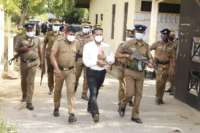The so-called “war on terror,” initiated by the U.S. and its global allies in response to the 9/11 attacks in 2001, did not so much change the rules of warfare as throw them out of the window.
In the aftermath of 9/11 and the ensuing wars in Afghanistan and Iraq, the Geneva Convention on the treatment of prisoners of war was virtually abandoned when the U.S. and its allies detained hundreds of thousands of men, women and children, mainly civilians. The use of torture and indefinite arbitrary detention became defining features of the war on terror.
Intelligence yielded from the use of torture was not particularly effective, and experimentation on human subjects was an element of the process. Guantánamo Bay, which currently holds 36 prisoners, is viewed by many human rights defenders as a final remnant of the policy of mass arbitrary detention.
The little light shed on these practices has largely been the result of hard and persistent work by international and civil society organizations, as well as lawyers who continue to sue states and other parties involved on behalf of victims and their families, some of whom are still detained.
A report presented earlier this year by Fionnuala Ní Aoláin, the U.N. Special Rapporteur on counterterrorism and human rights, following up on a 2010 U.N. report on secret detention, found that the “failure to address secret detention” has allowed similar practices to flourish in North-East Syria and Xinjiang Province in China.
North-East Syria
How to deal with arbitrarily detained alleged ISIS (also known as Daesh) militia supporters and fighters in Syria and Iraq is an issue that goes back to the Obama era, but gained traction in 2018-2019, when ISIS lost its last major stronghold and significant territory, leading existing detention camps, like Al-Hawl, to swell in size. Al-Hawl was set up as an Iraqi refugee camp by the U.N. in 1991 with capacity for around 15,000 people. In 2018, it held around 10,000 Iraqi refugees. The majority of the 73,000-plus residents of this camp since 2019 are women and children, around 11,000 of whom are nationals of countries other than Syria or Iraq, living in poor shelter, hygiene and medical conditions.
All are detained by the Autonomous Administration of North and East Syria (AANES) and the Syrian Defense Force (SDF), which are not state entities. Their efforts to investigate and prosecute possible ISIS fighters are still at the early stages, lack formal and widespread recognition and do not look at potential war crimes. With some prisoners detained for over six years, without charge, trial or formal identification, the situation is pretty much as it was in Afghanistan and Iraq.
According to Ní Aoláin, “No legal process of any kind has been established to justify the detention of these individuals. No public information exists on who precisely is being held in these camps, contrary to the requirements of the Geneva Conventions stipulating that detention records be kept that identify both the nationality of detainees and the legal basis of detention.”
She further states that, “These camps epitomize the normalization and expansion of secret detention practices in the two decades since the establishment of the detention facility at Guantánamo Bay, Cuba. The egregious nature of secret, incommunicado, harsh, degrading and unacceptable detention is now practised with impunity and the acquiescence of multiple States.”
In addition, around 10,000 men and 750 boys (of whom 2,000 and 150 are respectively not from Syria or Iraq) are held in some 14 detention centers in North-East Syria, accused of association with ISIS: “No judicial process has determined the legality or appropriateness of their detention. There are also reports of incommunicado detention.”
Efforts have been made, with varying success, to repatriate and release Iraqi refugees and Syrians internally displaced by the regional conflict: Around 2400 Iraqis have been repatriated over the past year or so.
European and other Western states were initially reluctant to repatriate their nationals — with former President Trump threatening to force them to — and some, such as the U.K., introducing measures to strip them of citizenship to prevent that. More recent efforts by European states have taken on a gendered approach, aimed at repatriating women and children in the camps. This approach, however, ignores the practice of the SDF to separate boys as young as 9 from their families and detain them, as a security risk, with men in prisons. Concern was only expressed during a prison break in early 2022 when it was feared these children would fall into ISIS’s hands, as though they were somehow safe with their original captors.
Missing the Point
The gendered approach to repatriation of detainees plays into long-standing orientalist and imperialist views, framing Western powers as saviors of these women and children, whereas the men and boys left behind remain “ISIS fighters” without investigation and substantiation of this status.
In spite of the recent U.S. conviction of two former British ISIS fighters for their role in the kidnapping and deaths of Western hostages, the value of such a detention policy must be questioned. As in Afghanistan and Iraq, arbitrary detention and cruel punishment of hundreds of thousands of people, sometimes in conditions worse than those they are associated with, is unjustifiable.
Ní Aoláin’s report also found that no war on terror detainees have “received a complete and adequate legal remedy,” and the lack of due process has resulted in the continuing stigmatization and persecution of prisoners upon release from Guantánamo.
Two decades on, the absence of justice at Guantánamo remains a recurring theme. Prosecutors are now seeking a plea deal settlement with defense lawyers in the 9/11 case that would avoid trial — and thus torture revelations — and the death penalty, as the case continues to drag over a decade on.
The farce of “justice” is also amply demonstrated by the failure to release Majid Khan, who, following a plea bargain and several years of torture in secret CIA prisons, completed his sentence on March 1; the military jurors at his sentencing hearing decried the torture he faced and petitioned for clemency for him. However, he remains at Guantánamo as it is too unsafe for him to return to Pakistan and the U.S. has found no safe country for relocation. After being sued to take action, the U.S. Department of Justice has responded by opposing his habeas plea and claiming that he is still not subject to the Geneva Conventions.
What Justice?
The outcome of two decades of secret and arbitrary detention has been to deny justice to the victims of war crimes and terrorist acts, and create new victims — detainees and their families — who are also denied justice.
After two decades, the failure to close Guantánamo and end such secret and arbitrary detention and the secrecy that continues to surround them (such as the refusal to disclose the full 2014 Senate CIA torture report) are not errors or oversight but deliberate policy. It affords impunity for states and state-backed actors while tarring detainees with the “terrorist” label for the rest of their lives without due process, effectively leaving them in permanent legal limbo in many areas of everyday life.
A year after the U.S. withdrawal from Afghanistan, justice still evades the Afghan people. With the International Criminal Court (ICC) seeking to restart its investigation, but excluding the U.S. and its Afghan allies from its scope, effectively granting them impunity while focusing on the Taliban, “the ICC has so far come to represent selective and delayed justice to many victims of war in Afghanistan,” according to Shaharzad Akbar, former chair of the Afghanistan Independent Human Rights Commission. In addition, “a year after the withdrawal of international forces and many ‘lessons learned’ exercises, key troop contributing countries such as the United States, the U.K., and others in NATO are yet to reflect on the legacy of impunity they left behind.”
Not Going Anywhere
Addressing her report to the U.N. in April, Ní Aoláin stated, “It is precisely the lack of access, transparency, accountability and remedy that has enabled and sustained a permissive environment for contemporary large-scale detention and harm to individuals.”
Ní Aoláin expresses concerns in her report over the “lack of a globally agreed definition of terrorism and (violent) extremism, and […] the widespread failure to define acts of terrorism in concrete and precise ways in national legislation.” The vague definition has meant that any form of dissent and resistance against the state can effectively be labelled terrorist activity.
The focus on Guantánamo and mass detention of alleged terrorism suspects has drawn the attention away from the carceral practices of states. Torture, lengthy solitary confinement, rape, and other prisoner abuses in federal jails has not prompted the same criticism or action. The focus on ISIS prisoners also draws away attention from the mass detention and abuse of those incarcerated in Syrian prisons.
At the same time, mass arbitrary and secret detention of alleged terrorists has helped to justify the expansion of the prison-industrial complex, with the involvement of private contractors. Over the past two decades, the use of torture has grown worldwide. Perhaps most worrying has been the boom in the mass arbitrary detention and abuse of men, women and children worldwide without due process and few legal rights known as immigration detention, with the reframing of migration and asylum as a security issue over the past two decades.
That such reports and monitoring of the situation continue at the highest level and by civil society organizations means that the prisoners have not been obscured and forgotten or their situation normalized as much as the states involved would like them to be. The need for justice for all victims is on the path to any kind of peace, and thus it remains essential to keep pressing and supporting Ní Aoláin’s call for “access, transparency, accountability and remedy.”
This post was originally published on Latest – Truthout.

